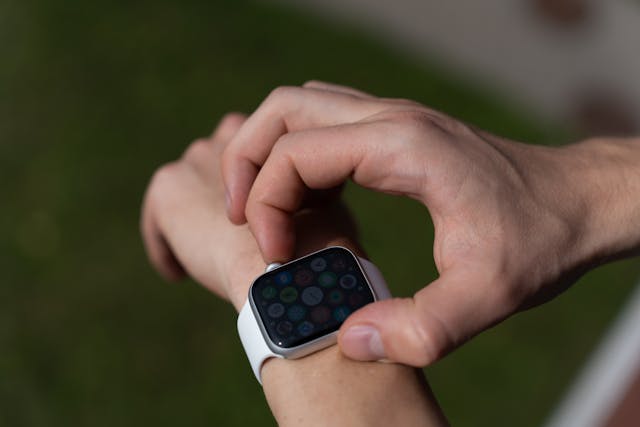Fitness trackers have gone from a novelty to a ubiquitous presence in our lives. These sleek bands on our wrists monitor our steps, heart rate, sleep patterns, and more, offering a constant stream of data about our activity levels. But what is next for this ever-evolving technology? Buckle up, fitness enthusiasts – the future of wearable tech promises a world where our devices not only track every move, but also become intelligent companions on our path to a healthier, happier us.

Beyond the Basics: Enhanced Data and Personalized Insights
The days of simply counting steps are numbered. Future wearable tech is poised to offer a deeper dive into our fitness data. Imagine sensors that track not just steps, but also stride length, impact force, and muscle activation during workouts. This granular data can help users optimize their training routines, identify areas for improvement, and even prevent injuries. Personalized insights will be key, with AI-powered algorithms analyzing data to create custom workout plans, adjust intensity levels based on fatigue, and offer real-time feedback on form and technique.
Sleep Tracking Gets Smarter:
Sleep is a crucial pillar of health, and future wearables will take sleep tracking to the next level. Advanced sleep stage monitoring will go beyond simply measuring REM, light, and deep sleep cycles. Imagine sensors that detect sleep disturbances like sleep apnea or restless leg syndrome, allowing for early intervention and improved sleep quality. Additionally, wearables might analyze sleep patterns to predict potential health issues and suggest lifestyle adjustments to promote better sleep.
Bridging the Gap Between Fitness and Wellness:
The future of fitness is about a holistic approach to well-being. Wearables will bridge the gap between physical activity and overall wellness. Imagine devices that monitor stress levels through heart rate variability or skin conductance, offering stress-reduction techniques like guided meditations or breathing exercises. Biofeedback features might show users how their physical activity directly impacts their mental state, motivating them to prioritize both physical and mental fitness.
The Rise of Smart Clothing:
Wearable tech is no longer confined to wristbands. Smart clothing is emerging as a game-changer in fitness tracking. Imagine workout shirts that monitor muscle activity and provide real-time feedback on form, or sports bras that analyze running technique to prevent injuries. Imagine shoes that track stride patterns and offer personalized recommendations for running style improvement. The future holds immense potential for seamless integration of technology into our clothing, creating a truly immersive and personalized fitness experience.
Beyond the Individual: Gamifying Fitness and Building Community
Fitness wearables will not only track individual progress but also foster a sense of community. Imagine fitness challenges with friends, where virtual leaderboards push each other to achieve goals. Social media integration could allow users to share workout data and celebrate milestones together. Gamification features like earning points or badges for achieving goals can add a fun and motivating element to fitness routines.
Privacy Concerns and Ethical Considerations:
The explosion of data collection raises the crucial question of privacy. Users should have complete control over their data, who has access to it, and how it is used. Robust security measures and clear data privacy policies will be essential for building trust with users. Furthermore, ethical considerations regarding the potential for body shaming or comparison culture promoted by wearable tech need to be addressed.
The Future is Here (Almost):
While some of these advancements might seem futuristic, many are already in development. We are seeing prototypes for smart clothing, and advancements in AI are paving the way for personalized fitness coaching through wearables. The future of fitness is shaping up to be an exciting one, where technology seamlessly integrates with our lives, empowering us to reach our full potential and achieve our health and wellness goals.
The Takeaway:
Wearable technology is undoubtedly transforming the way we approach fitness. With advancements in tracking capabilities, intelligent coaching features, and AI integration, wearables are poised to become even more sophisticated tools for achieving our health and wellness goals. As we embrace the future of wearable tech, let us do so with a critical eye, ensuring this technology empowers us on our journey towards a healthier and more
